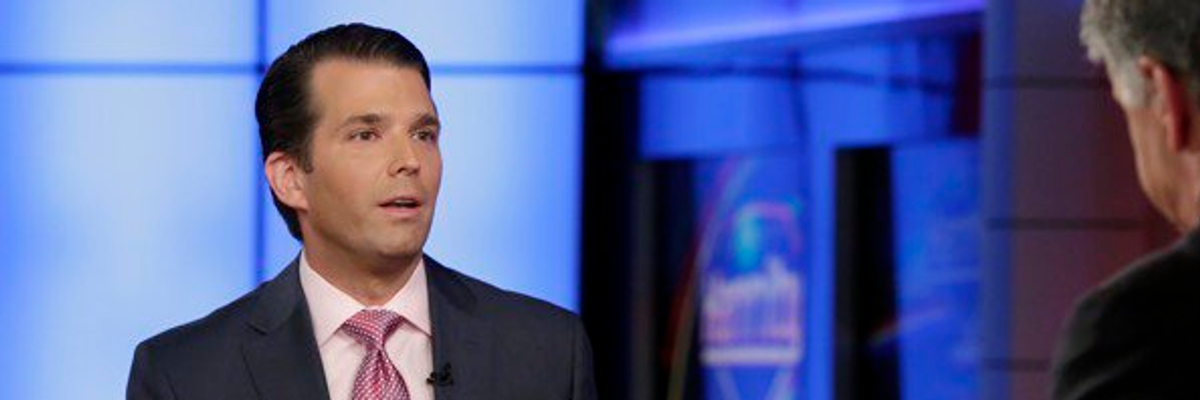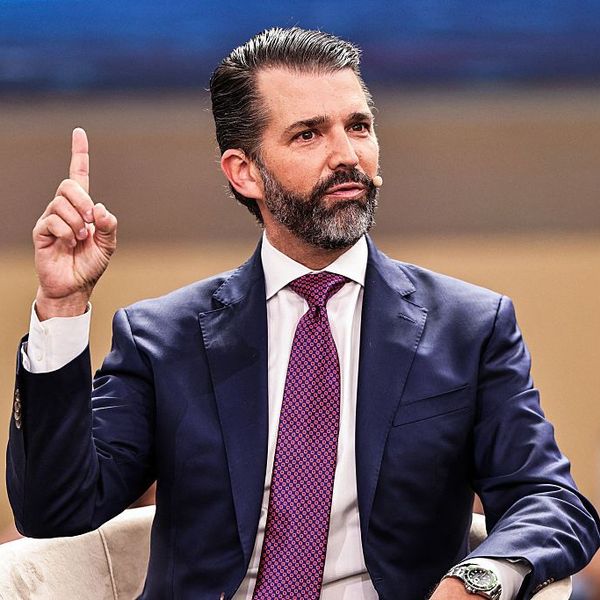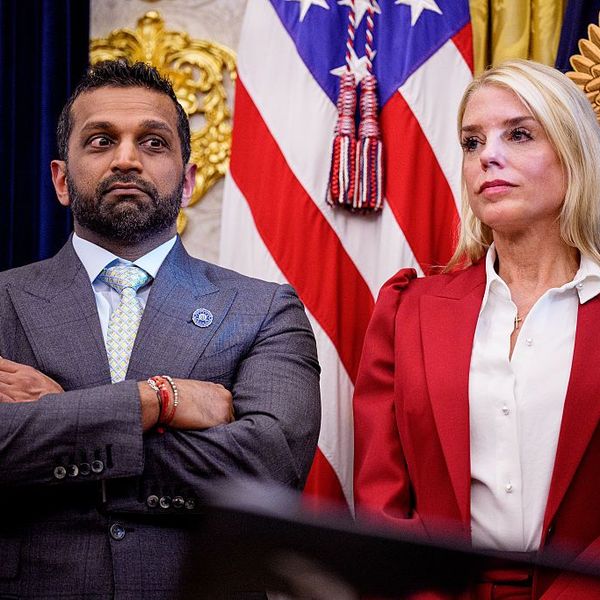
Donald Trump Jr. appeared on FOX News channel's Hannity on Tuesday, July 17, 2017. (Image: Screenshot/FOX News)
Not Just a Personal Problem for Trump Jr.-Now Trouble for the Trump Campaign and Trump Sr.
There is an impression developing in the current reporting that somehow Donald Trump Jr.'s emails and activities may be primarily a personal problem. But he was, of course, an agent of the campaign, acting on its behalf, when he arranged the meeting with the Russian lawyer. He successfully invited to that meeting senior campaign brass, including the campaign manager.
There is an impression developing in the current reporting that somehow Donald Trump Jr.'s emails and activities may be primarily a personal problem. But he was, of course, an agent of the campaign, acting on its behalf, when he arranged the meeting with the Russian lawyer. He successfully invited to that meeting senior campaign brass, including the campaign manager. Jared Kushner and Paul Manafort are included on the entire email chain reflecting in clear terms the Russian government's support for the Trump campaign and the scheduling of the meeting so that a Russian government lawyer could tender negative information on Secretary Clinton. This is not an individual venture of Trump Jr. that the Trump campaign can somehow disavow.
So while the individuals in question may not escape liability, the serious issue raised by the meeting exposes the campaign as an organization to criminal legal jeopardy. Any illegal "solicitation" of support from Russia is also the campaign's illegal solicitation. It is for the campaign's benefit that its leadership expressed interest in what the lawyer had.
Under campaign finance regulations, the meeting could without question be considered a solicitation (at least under the facts so far known). The law defines a solicitation to include any request for a contribution, or "anything of value," even if the request is implicit in the circumstances rather than expressly communicated. The regulations provide specifically that the solicitation "may be made directly or indirectly," based on all relevant factors, including the "conduct of the persons involved in the communication."
Now consider the email exchange released by Trump Jr. The emails contained a clear offer from Russian government sources of information that might be helpful to the campaign. Then Trump Jr. responded that "if it's what you say I love it"-that is, he would glad to have information with the content described by the intermediary for the Russians. He then scheduled the meeting to consider whatever the Russians had. All these facts together indicate that, rather than declining the offer and rejecting a meeting, the campaign was communicating its interest in receiving this negative material. For campaign finance law purposes, and in the words of the ban on solicitations, the campaign was issuing "a clear message" that the Russians provide something "of value."
The campaign is now squarely in the middle of the questions about whether any overtures to Russia were mere part of a concerted effort to have foreign national support for the Trump candidacy. President Trump famously appealed to them for help in locating the deleted Clinton emails, but later claimed that he was only joking. And some have thought that perhaps Donald Jr. went "rogue" and acted, out of inexperience, on his own. But the email string released by Trump Jr., copied to the campaign management, followed by the meeting attended by senior leadership, reveals a campaign aware of offers of Russian support and expressing eagerness to accept it.
Of course, the campaign is Donald Trump's campaign, his authorized committee for seeking election to the presidency. The meeting in question, by bringing the question to the campaign, brings it ever closer to him. Was he aware that the campaign was courting assistance from the Russian government? Will his campaign team all testify that on an organizational initiative so central to his electoral strategy, they said nothing to the candidate about these communications from and with Russia?
An Urgent Message From Our Co-Founder
Dear Common Dreams reader, The U.S. is on a fast track to authoritarianism like nothing I've ever seen. Meanwhile, corporate news outlets are utterly capitulating to Trump, twisting their coverage to avoid drawing his ire while lining up to stuff cash in his pockets. That's why I believe that Common Dreams is doing the best and most consequential reporting that we've ever done. Our small but mighty team is a progressive reporting powerhouse, covering the news every day that the corporate media never will. Our mission has always been simple: To inform. To inspire. And to ignite change for the common good. Now here's the key piece that I want all our readers to understand: None of this would be possible without your financial support. That's not just some fundraising cliche. It's the absolute and literal truth. We don't accept corporate advertising and never will. We don't have a paywall because we don't think people should be blocked from critical news based on their ability to pay. Everything we do is funded by the donations of readers like you. Will you donate now to help power the nonprofit, independent reporting of Common Dreams? Thank you for being a vital member of our community. Together, we can keep independent journalism alive when it’s needed most. - Craig Brown, Co-founder |
There is an impression developing in the current reporting that somehow Donald Trump Jr.'s emails and activities may be primarily a personal problem. But he was, of course, an agent of the campaign, acting on its behalf, when he arranged the meeting with the Russian lawyer. He successfully invited to that meeting senior campaign brass, including the campaign manager. Jared Kushner and Paul Manafort are included on the entire email chain reflecting in clear terms the Russian government's support for the Trump campaign and the scheduling of the meeting so that a Russian government lawyer could tender negative information on Secretary Clinton. This is not an individual venture of Trump Jr. that the Trump campaign can somehow disavow.
So while the individuals in question may not escape liability, the serious issue raised by the meeting exposes the campaign as an organization to criminal legal jeopardy. Any illegal "solicitation" of support from Russia is also the campaign's illegal solicitation. It is for the campaign's benefit that its leadership expressed interest in what the lawyer had.
Under campaign finance regulations, the meeting could without question be considered a solicitation (at least under the facts so far known). The law defines a solicitation to include any request for a contribution, or "anything of value," even if the request is implicit in the circumstances rather than expressly communicated. The regulations provide specifically that the solicitation "may be made directly or indirectly," based on all relevant factors, including the "conduct of the persons involved in the communication."
Now consider the email exchange released by Trump Jr. The emails contained a clear offer from Russian government sources of information that might be helpful to the campaign. Then Trump Jr. responded that "if it's what you say I love it"-that is, he would glad to have information with the content described by the intermediary for the Russians. He then scheduled the meeting to consider whatever the Russians had. All these facts together indicate that, rather than declining the offer and rejecting a meeting, the campaign was communicating its interest in receiving this negative material. For campaign finance law purposes, and in the words of the ban on solicitations, the campaign was issuing "a clear message" that the Russians provide something "of value."
The campaign is now squarely in the middle of the questions about whether any overtures to Russia were mere part of a concerted effort to have foreign national support for the Trump candidacy. President Trump famously appealed to them for help in locating the deleted Clinton emails, but later claimed that he was only joking. And some have thought that perhaps Donald Jr. went "rogue" and acted, out of inexperience, on his own. But the email string released by Trump Jr., copied to the campaign management, followed by the meeting attended by senior leadership, reveals a campaign aware of offers of Russian support and expressing eagerness to accept it.
Of course, the campaign is Donald Trump's campaign, his authorized committee for seeking election to the presidency. The meeting in question, by bringing the question to the campaign, brings it ever closer to him. Was he aware that the campaign was courting assistance from the Russian government? Will his campaign team all testify that on an organizational initiative so central to his electoral strategy, they said nothing to the candidate about these communications from and with Russia?
There is an impression developing in the current reporting that somehow Donald Trump Jr.'s emails and activities may be primarily a personal problem. But he was, of course, an agent of the campaign, acting on its behalf, when he arranged the meeting with the Russian lawyer. He successfully invited to that meeting senior campaign brass, including the campaign manager. Jared Kushner and Paul Manafort are included on the entire email chain reflecting in clear terms the Russian government's support for the Trump campaign and the scheduling of the meeting so that a Russian government lawyer could tender negative information on Secretary Clinton. This is not an individual venture of Trump Jr. that the Trump campaign can somehow disavow.
So while the individuals in question may not escape liability, the serious issue raised by the meeting exposes the campaign as an organization to criminal legal jeopardy. Any illegal "solicitation" of support from Russia is also the campaign's illegal solicitation. It is for the campaign's benefit that its leadership expressed interest in what the lawyer had.
Under campaign finance regulations, the meeting could without question be considered a solicitation (at least under the facts so far known). The law defines a solicitation to include any request for a contribution, or "anything of value," even if the request is implicit in the circumstances rather than expressly communicated. The regulations provide specifically that the solicitation "may be made directly or indirectly," based on all relevant factors, including the "conduct of the persons involved in the communication."
Now consider the email exchange released by Trump Jr. The emails contained a clear offer from Russian government sources of information that might be helpful to the campaign. Then Trump Jr. responded that "if it's what you say I love it"-that is, he would glad to have information with the content described by the intermediary for the Russians. He then scheduled the meeting to consider whatever the Russians had. All these facts together indicate that, rather than declining the offer and rejecting a meeting, the campaign was communicating its interest in receiving this negative material. For campaign finance law purposes, and in the words of the ban on solicitations, the campaign was issuing "a clear message" that the Russians provide something "of value."
The campaign is now squarely in the middle of the questions about whether any overtures to Russia were mere part of a concerted effort to have foreign national support for the Trump candidacy. President Trump famously appealed to them for help in locating the deleted Clinton emails, but later claimed that he was only joking. And some have thought that perhaps Donald Jr. went "rogue" and acted, out of inexperience, on his own. But the email string released by Trump Jr., copied to the campaign management, followed by the meeting attended by senior leadership, reveals a campaign aware of offers of Russian support and expressing eagerness to accept it.
Of course, the campaign is Donald Trump's campaign, his authorized committee for seeking election to the presidency. The meeting in question, by bringing the question to the campaign, brings it ever closer to him. Was he aware that the campaign was courting assistance from the Russian government? Will his campaign team all testify that on an organizational initiative so central to his electoral strategy, they said nothing to the candidate about these communications from and with Russia?

